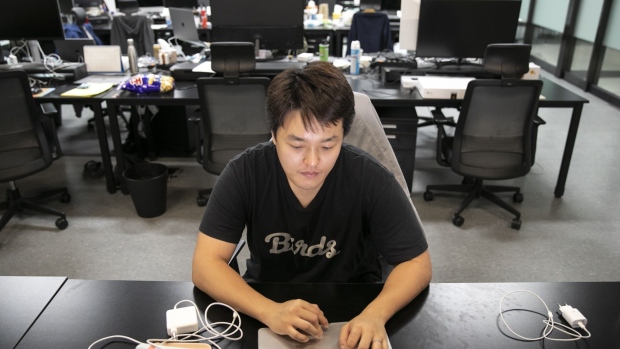Sep 27, 2022
Bitcoin Reserve Linked to Fugitive Do Kwon Denies Moving Tokens
, Bloomberg News

(Bloomberg) -- A Bitcoin reserve connected to fallen crypto entrepreneur Do Kwon denied transferring digital tokens after a trail of coin movement prompted South Korean prosecutors to take steps to freeze assets.
The reserve, the Luna Foundation Guard, said on Twitter that it “hasn’t created any new wallets or moved $BTC or other tokens held by LFG since May 2022.”
The tweet emerged after prosecutors Tuesday sought to freeze assets linked to Kwon, who is wanted in South Korea on suspicion of breaking securities laws amid the $60 billion implosion of his Terraform Labs crypto ecosystem.
Prosecutors have confirmed reports that they sent requests to crypto exchanges KuCoin and OKX to freeze a total of 3,313 Bitcoins -- worth about $67 million at current prices -- that had been moved to the venues from a wallet linked to Kwon’s Luna Foundation Guard.
OKX confirmed the receipt of a request from South Korean authorities and said it’s been cooperating with the investigation. A KuCoin spokesperson said that the firm is willing to cooperate with law enforcement while adding it’s for authorities to comment further on the matter.
Prosecutors in Seoul declined to comment on the Luna Foundation Guard tweet.
South Korea has sought help from Interpol to find Kwon, whose Terra stablecoin project collapsed in May. His location is unknown after Singapore earlier this month said he’s no longer there. South Korean prosecutors on Sept. 14 said a court had issued a warrant for Kwon’s arrest.
On Monday, the 31-year-old took to Twitter to say that he’s “making zero effort to hide,” adding “I go on walks and malls.” In his latest post, he said that he hasn’t “used kucoin or okex in at least the last year, and no funds of tfl, lfg or any other entities have been frozen.”
According to researcher CryptoQuant, a new wallet address believed to belong to the LFG was created on Sept. 15. After that, a total of 3,310 Bitcoins were moved from the wallet to KuCoin and OKX, CryptoQuant said.
“CryptoQuant specified new Bitcoin addresses owned by LFG based on transaction patterns, adjacent flows and material non-public information,” the researcher said in an emailed statement.
The TerraUSD stablecoin’s peg to the US dollar was mainly maintained through a complex mix of algorithms and trader incentives involving its sister token Luna. Earlier in the year, Kwon had set up the LFG as an additional safeguard, accumulating a reserve of crypto that could be deployed in times of stress.
Between January and March, the LFG bought $3.5 billion of Bitcoin, according to blockchain forensics firm Elliptic. Those measures ultimately proved useless in early May, with Kwon and the LFG both saying they’d spent nearly all of the reserve to try to stabilize TerraUSD and Luna.
(Updates with statements from exchanges in the fifth paragraph.)
©2022 Bloomberg L.P.





